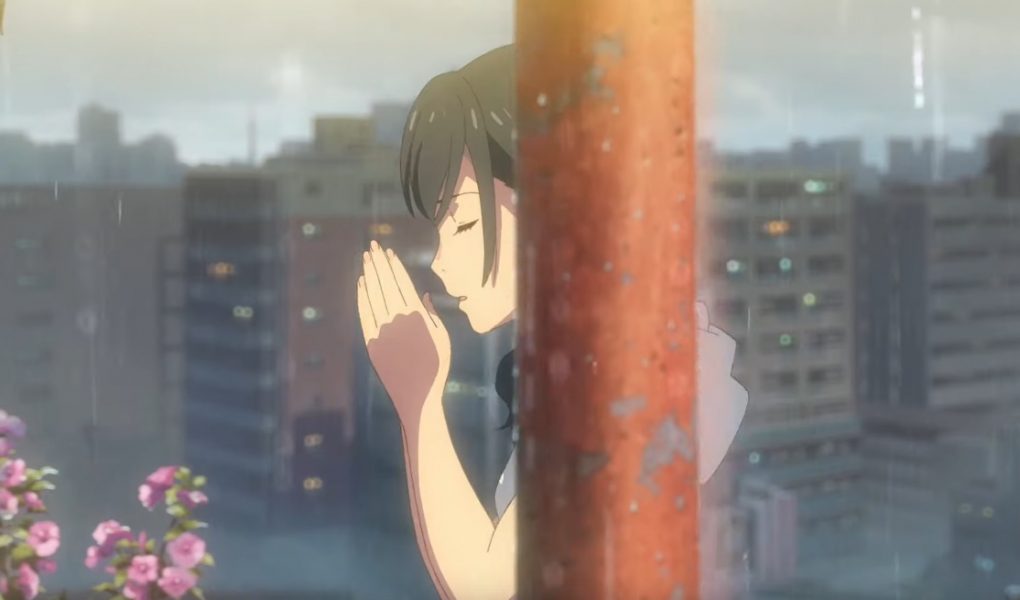Drown the city to save yourself and your love.
Spoilers for the entirety of Weathering with You/Tenki no Ko.
I have to applaud Makoto Shinkai. After producing what could arguably be called the most successful anime movie ever (and a film I genuinely loved), he returns two years later with a follow-up that not only avoids the pitfall of existing so much in the space of Your Name. that it demands direct comparison, but also manages to touch on entirely different thematic concerns. No, Tenki no Ko is not the kind of broadly evocative treatise on longing and hope in the modern era that Kimi no Na Wa was. Instead, it exists on its own terms, despite a charming overlap of the two films’ chronologies. It’s a stronger film and a stronger entry into Shinkai’s oeuvre for it.
If I were to sum up the differences between Weathering with You and Your Name. (and then I promise I’ll be done with referencing the latter), it would be by saying that Weathering with You is narrow where Your Name. was broad. The core of Weathering with You is in its interpersonal relationships, the little found families that spring up around runaway Hodaka as he tries to create a new life from himself in Tokyo. Even if you rightly argue that the individual characters are still somewhat lacking in depth, the same cannot be said of their bonds with each other, which lift up the characters collectively. This stands in contrast to Your Name.’s more distant, more tightly plotted approach, which concerns itself with a natural disaster as it affects an entire community—and, really, an entire nation.

The more narrow, personal focus of the film is clear as early as the film’s first little montage-cum-music video, which I actually feared had come too early and by abbreviation rendered the already obviously crucial relationships in Hodaka’s life with Suga and Natsumi less effective than they could have been. Thankfully, the film’s rapid pace actually serves to lessen the disappointment as the main plot points serve to fill out the relationships sufficiently. But there is so much life in Hodaka’s adorable efforts to be useful and independent that I would have gladly taken another ten minutes of slice-of-life antics to allow those relationships to settle in a deeper way.
Likewise, the secondary trio of Hodaka, Hina, and Nagi quickly triangulate a tangible bond that causes you to desire their safety and happiness. The parallel montage (twice in the same film? surely the trick has run its course now, Shinkai-kantoku) of their efforts to run the 100%-sunshine girl business eventually culminates in the euphoric party they throw in the hotel room, my favorite scene of the entire film [1] (which is then followed by the fantastically vulnerable moment where Hodaka and Hina embrace and bawl together). Indeed, even the cartoony character animation—from funny expressions to the wide-eyed cat to the very important Hodaka (><) faces—contributes in a major way here, imbuing the characters with a certain kind of accessible life distinct from the aesthetic of a more delicate realism.

The narrowness of Weathering with You, though, poses some interesting questions when the personal stories of the characters begin to contact the unavoidably broad element of the weather—a feature of the film that Shinkai and his producers have explicitly said was inspired by climate change. “[H]e makes his sun rise on the evil and on the good, and sends rains on the just and on the unjust,” as Matthew 5:45 (RSV) says; in other words, the weather isn’t personal. Although the choice Hodaka and Hina make to deny the human sacrifice and thereby reverse the weather (eventually drowning Tokyo) affects everyone who lives in the city, the final line of the film is one held only between the two of them: Hina-san… I’m sure we’re going to be okay! [2]
Others protest, but Hodaka eventually comes to the conclusion that yes, their choice changed the world. And this brings with it the natural question: was it the right choice? I find myself torn. There is certainly an admirable nobility to sacrificing oneself for the greater good, but there is likewise a kind of beauty in choosing other kinds of joy. In an emotional sense, I was glad to see Hina return to the world—to her younger brother, her life, and her communities. On the other hand, though, what of Tokyo? Kim Morrisey’s review of the film for Anime News Network notes that the film doesn’t flinch away from the aftermath of the disaster, which is true to some degree, but it can’t be said that Tenki no Ko really digs deep into what the consequences of Tokyo’s flooding must have been like. The only real consequence we witness is that Taki’s grandmother has been driven from her home, but she takes the disturbance with such grace that never feels like a problem [3]. Hodaka himself, once a part of the lower social class that would surely have suffered most, is spirited away from the results of his action by the police taking him home.

All that said, I don’t particularly think that judging Hodaka and Hina’s choice as right or wrong is all that interesting, nor even the real point. Shinkai’s interviews have revealed that he’s very aware of the potentially controversial nature of the film’s ending, which perhaps turns the real question being asked toward the viewer—should we really be willing to accept that one person, a human being just like us and unknowingly marked as sacrifice, ought to bear all the weight of fixing the world’s ills? Maybe the real question is not whether Hodaka and Hina were right, but whether we are right to expect them to choose the path of sacrifice.
DanielsansLions touches on this to a degree in a blog post, arguing that the film “denounces epistemic violence” and comparing it to similar stories of utilitarian sacrifice [4]. Frog-kun, too, notes that trying to extend the the film’s messaging to real-world climate change doesn’t really work—Tenki no Ko is definitely not asking whether it would be just to sacrifice one person to fix climate change. In considering their thoughts, I was reminded of 2018’s Hisone to Masotan, which features a similar conceit of an impending natural-divine disaster that must be controlled by the sacrifice of a young girl’s life. In Hisomaso, protagonist Hisone interrupts the ritual that will enact the exchange, declaring that, “It’s too messed up to sacrifice yourself!” She later completes the ritual herself, but is shown in the show’s final scene to have returned—interrupting the mythical cycle of sacrifice and defying the binary choice of “sacrifice yourself, or sacrifice the world.”

Hisomaso might be seen as having its cake and eating it too with this ending, whereas Tenki no Ko takes a harsher path by making clear that Hina severing her connection with nature has clear consequences. But both works still serve to challenge the idea of sacrificing the one for the many. Hisone (along with her trusty Masotan) trample riotously over the tragic archetype, while Hina ultimately chooses her own personal happiness over becoming the “one human sacrifice.” I find such rejections of the tired cliché of a young woman’s sacrifice—whether to her job or her fate—somewhat refreshing, personally.
That said, as a Catholic, John 13:15 comes to mind: “Greater love has no man than this, that a man lay down his life for his friends” (rsv). Of course, coming from the Son of God who died for the salvation of humanity’s souls, one might wonder if this teaching applies in all circumstances—including preventing a city from going underwater. Theologically, I suspect such quibbling would be seen as little more than selfish nonsense. And anyways, this leads us back to the deliberation which I have already stated I wanted to avoid—the question of altruistic sacrifice versus the pursuit of personal desire ultimately is one of judgment on Hodaka and Hina. The more compelling question remains whether it is right for us, the audience, to say that they were correct or not.

Shinkai’s own thoughts on what he was trying to communicate in Weathering with You (he said in the post-film interview that he saw the film as pushing back against society’s pressure on the young to act a certain way [5]) and his awareness of the potential controversy of the film’s ending seem to direct our attention to this question. If the youth of the world are compelled make the choice to destroy their own lives to save the world—one might recall Greta Thunberg’s fierce words, “This is all wrong. I shouldn’t be standing here. I should be back in school on the other side of the ocean.”—perhaps it is not them who deserve to be judged. Hina only prayed for sunshine; she never asked to become a sunshine girl. So perhaps it is all of us who might be tempted to expect a fifteen-year-old girl to become a sacrifice who ought to be judged.
At the very least, it’s something that’s worth thinking about. As for me? Well, Weathering with You left me with bittersweet feelings, but I think I was happier to see Hodaka and Hina reunited that I would have been to watch Hina be lost to the clouds forever.
How about you?

Sidebars—
[1] To Tenki no Ko‘s credit, I found the film’s romance almost Toradora-like in the way that Hodaka’s growing feelings for Hina develop through mutual partnership and activity. Sure, he has a crush on her from the start, but the familial way that he integrates into life with Nagi and her in their struggle for economic survival recalls Ryuuji and Taiga’s camaraderie as colleagues-in-romance.
[2] Not to mention Hodaka’s opening narration: “This is a story only she and I know.”
[3] Incidentally, I think it’s quite obvious that neither the priest who discusses the patterns of the weather nor Taki’s grandmother are intended as rebuttals against climate change, but rather philosophical perspectives to inform our reactions to reality. Even if mankind has undeniably impacted Mother Nature, she still maintains her sovereignty and we would do well to respect it. A reading of the film that sees either scene as climate change denialism is, in my opinion, embarrassingly shallow.
[4] I’ll note that I’m not fully on board with DanielsansLions’s ideas about Hina’s agency, as in my view she makes the choices to accept her fate and then reject it all on her own. “Pray for yourself!” Hodaka tells her as they spin through the clouds, placing the final decision in Hina’s hands.
[5] The most fascinating part of that interview, though, was Shinkai discussing Your Name. as a symbol that anime films could be successful even if they weren’t made by Miyazaki, and how he and Comix Wave Films are still trying to find their direction after Your Name.‘s massive success.





